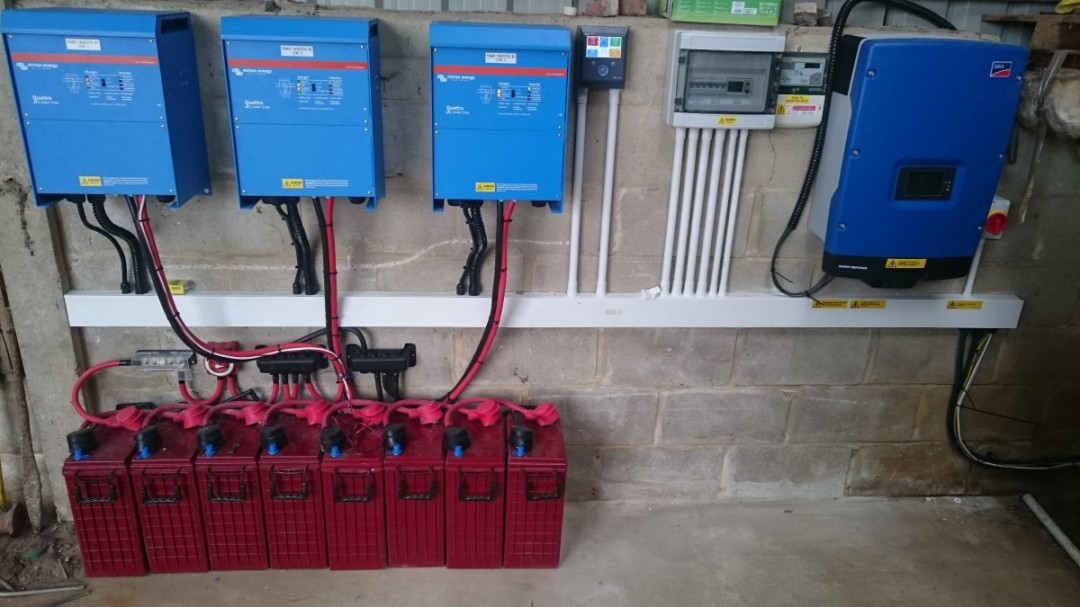Understanding Your Off-Grid Battery Needs
Before diving into the specifics of battery types, it’s crucial to understand your energy consumption patterns. How much power do you use daily? What are your peak usage times? These factors will significantly influence the battery capacity you require.
A well-designed off-grid system should balance energy production (solar panels) with energy storage (batteries) and consumption (appliances). Oversizing either component can lead to inefficiencies and increased costs.

Types of Batteries for Off-Grid Systems
Lead-Acid Batteries
These were once the standard for off-grid systems. Available in flooded, gel, and AGM (Absorbent Glass Mat) varieties, they are relatively affordable. However, they have a shorter lifespan compared to newer technologies and require regular maintenance.
Pros: Cost-effective, widely available.
Lithium-Ion Batteries
Rapidly gaining popularity, lithium-ion batteries offer superior performance and longevity. They have a higher energy density, meaning more storage in a smaller space. While initially more expensive, they often balance out the cost over time due to their longer lifespan and reduced maintenance.
Pros: Longer lifespan, higher energy density, no maintenance, faster charging.
Lithium-Iron-Phosphate (LFP) Batteries
A specific type of lithium-ion battery, LFPs are known for their safety and long cycle life. They are less prone to thermal runaway and can handle more charge-discharge cycles.
Pros: Excellent safety, long cycle life, good performance in high temperatures.
Factors to Consider When Choosing a Battery
Depth of Discharge (DoD)
This refers to the amount of energy you can extract from a battery before it’s fully depleted. Lithium-ion batteries generally handle deeper discharges better than lead-acid, but it’s essential to check the manufacturer’s specifications.
Battery Capacity
Measured in amp-hours (Ah) or kilowatt-hours (kWh), this indicates the amount of energy a battery can store. Your energy needs will determine the required capacity.
Charge and Discharge Rates
Consider how quickly you need to charge and discharge your battery. Some batteries can handle high rates better than others.
Battery Lifespan
The number of charge-discharge cycles a battery can endure before its capacity significantly decreases. Lithium-ion batteries generally offer longer lifespans.
Temperature Range
Battery performance can be affected by temperature extremes. Consider the climate in your location.
Conclusion
Selecting the right battery for your off-grid system is crucial for its efficiency and longevity. While lead-acid batteries remain a budget-friendly option, lithium-ion, especially LFP, is gaining traction due to its superior performance and longer lifespan. Carefully assess your energy needs, budget, and local climate to make an informed decision.
FAQs
1. How long do off-grid batteries last?
Battery lifespan varies significantly depending on the type and how it’s used. Lead-acid batteries typically last 3-5 years, while lithium-ion batteries can last 8-15 years or more.
2. Can I use different types of batteries together in an off-grid system?
It’s generally not recommended to mix battery types due to differences in voltage, charging requirements, and state of charge.
3. How do I prevent premature battery failure?
Avoid deep discharges, maintain proper charging levels, and protect batteries from extreme temperatures. Regular maintenance is also essential.
4. What is the best battery for a small off-grid cabin?
A lithium-ion battery, especially LFP, is often a good choice for small cabins due to its long lifespan and high energy density.
5. How much does an off-grid battery system cost?
The cost varies widely based on battery type, capacity, and additional components. Lithium-ion batteries are generally more expensive upfront but can save money in the long run.